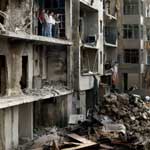Donor nations pledge $1b in aid for Lebanon
ABC Australia Last Update: Friday, September 1, 2006. 8:04am (AEST)

Lebanese officials estimate the damage from the conflict is in the billions of dollars. (AFP) |
Donor nations have pledged $US940 million ($A1.23 billion) in aid to help Lebanon rebuild destroyed infrastructure, shelter the homeless and remove unexploded bombs.
Representatives from European, Middle Eastern and Asian countries and the United States have met at an international donors’ conference to help fund Lebanon’s recovery from the devastation caused by the 34-day conflict between Israel and Hezbollah.
Swedish Foreign Minister Jan Eliasson says the total amount pledged so far for Lebanon’s acute needs comes to $US1.2 billion ($A1.57 billion).
He says the United States, the European Union and Gulf states have been the most generous donors.
“This conference has met its objectives by a wide margin,” he said, noting that Swedish organisers had originally hoped to raise $US500 million.
Cluster bomb maps
United Nations secretary-general Kofi Annan says he has asked Israel to hand over maps showing where its planes spread cluster bombs on Lebanon during the conflict against Hezbollah.
UN experts estimate there are more than 100,000 unexploded bomblets lying on the ground in the south of the country.
Speaking as he continued his Middle East tour, Mr Annan said urgent action is being taken to disarm the munitions.
He also criticised the use of cluster bombs in the first place.
“I think those kinds of weapons should not be used in civilian and populated areas and we are working very hard through our mine action unit to de-mine as quickly as possible,” he said.
Swedish Prime Minister Goran Persson says some of the $20 million his country is pledging will be used to clear unexploded bombs.
He has told Lebanon it is not alone and called on Israel to lift its blockade on Lebanon.
Gratitude
Lebanese Prime Minister Fouad Siniora says Lebanon had a future full of hope and promise, but now must pick up the pieces of its devastated country and economy.
He has expressed his gratitude for the donations, but says that the cost of the damage wrought by Israel’s offensive will run to billions of dollars.
“We discovered today that Lebanon is not alone,” he said.
“I believe we have a long way to go to get the economy back on the growth track. We will be up to the challenge.”
He says the conference bears witness to the resilience of Lebanon’s people and their determination to rise again.
Mr Siniora says losses in economic output, jobs, and the long-term direct and indirect costs to the economy, including lost revenues in tourism, agriculture and industry, are expected to be “billions more”.
He told the representatives of almost 50 countries and 12 organisations that any aid effort would be undermined unless Israel lifted its “humiliating” sea and air blockade on Lebanon.
Mr Siniora has vowed the money will be spent transparently, rejecting the idea that aid to southern Lebanon, where the Shiite militia Hezbollah is based, would end up in Hezbollah pockets.
“This idea that it will be siphoned in one way or another to Hezbollah is entirely, completely, a fallacy and is not true,” he said.
“The assistance will be channelled through government agencies and this will go to the needy people directly.
“It will not have any intermediary in any way.”
Mr Siniora has urged the United Nations Security Council to take a leading role in mediating peace in the region, and called on Israel to recognise Palestinian statehood and withdraw from all Arab lands it occupies.
“If we are to have real peace and stability in the Middle East, the root causes of this war must be addressed,” he said.
Underlying causes
UN deputy secretary-general Mark Malloch Brown has called for an immediate end to the blockade and a political solution to the underlying causes of the conflict.
“Otherwise aid risks substituting for the real oxygen of recovery – private investment – which will stay away if the risk of conflict remains high,” he said.
The UN High Commissioner for Refugees says about 300,000 people are still displaced, or 7 per cent of the Lebanese population.
About one million people had to flee their homes because of the conflict.
Lebanon’s long-term reconstruction needs are to be addressed at a conference to be held later this year.
– BBC/AFP

Recent Comments